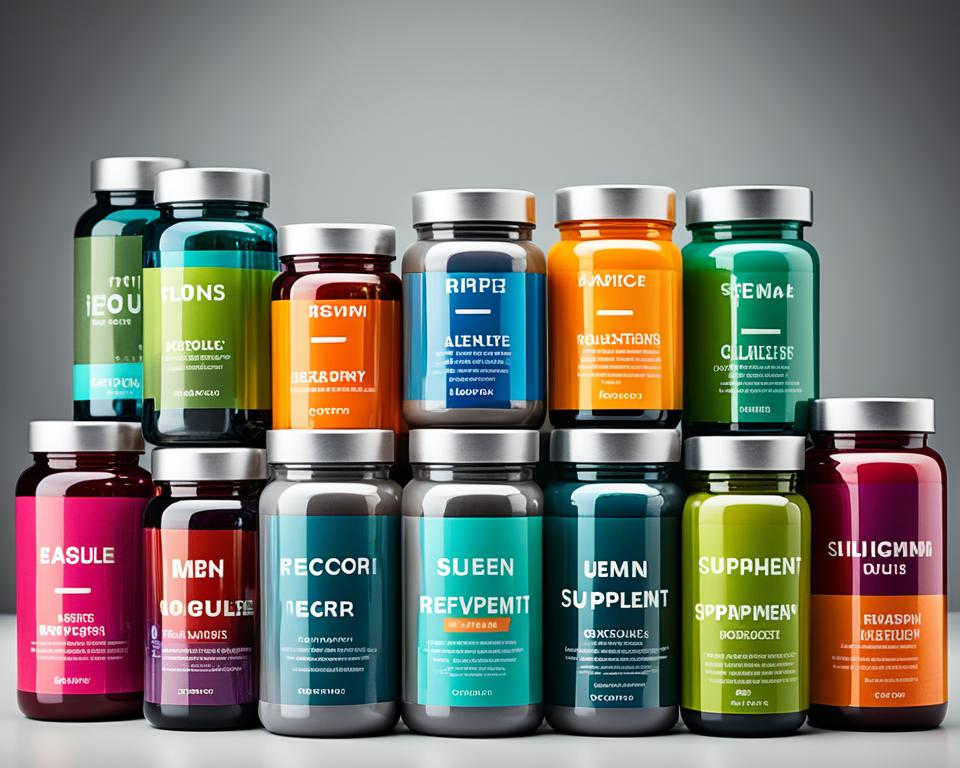Getting the most out of your workouts goes beyond just working hard. Proper muscle recovery is key. It repairs and rebuilds muscle, lessens soreness, and boosts how well you perform. This thorough guide looks at muscle recovery supplements. It gives you the lowdown on the nutrients and mixes that can up your game.
Read interesting things at : trainwithnexus
Key Takeaways
- Muscle recovery supplements are crucial for supporting the body’s natural repair and rebuilding processes.
- Protein powder, amino acids, and creatine are essential for muscle protein synthesis and performance enhancement.
- Antioxidants and anti-inflammatory supplements can help reduce exercise-induced oxidative stress and muscle soreness.
- Electrolyte replenishment is important for maintaining fluid balance and muscle function.
- A comprehensive approach that combines multiple recovery supplements can be more effective than relying on a single product.
Understanding Muscle Recovery
Muscle recovery is key in any workout plan. It helps repair muscle fibers after hard exercise. Without it, you might feel sore for a long time, do worse in your activities, and even get hurt more easily.
The Importance of Muscle Recovery
Getting your muscles to recover well is crucial. It lowers your chances of overworking, boosts your performance, and supports muscle growth. If you skip this step, your fitness could stall, and you might get injured more often.
Factors Affecting Muscle Recovery
Many things affect how well your muscles recover:
- Nutrition: Eating right is vital. Proteins, carbs, and fats help your muscles grow and give you energy.
- Hydration: Drinking enough water keeps your muscles working well and clears toxins from your body.
- Sleep Quality: Good sleep is when your muscles really fix themselves, improving how they recover.
- Stress Levels: Too much stress hurts your recovery by messing with hormones and raising inflammation.
- Workout Intensity and Duration: Harder or longer workouts demand more from your muscles, extending your recovery time.
Recognizing these recovery factors is the first step to better fitness. It sets the stage for reaching your workout goals and staying in top form.
Muscle Recovery Supplements Overview
Athletes and fitness fans often look for the best ways to improve. Muscle recovery supplements are key here. They help the body heal and grow muscles. This cuts down on pain, boosts performance, and speeds up recovery.
Types of Muscle Recovery Supplements
Different types of muscle recovery supplements fit various needs. You can find them in powders, pills, or liquids. They do things like build proteins, ease swelling, or refill energy. Common supplements are protein powders, BCAAs, creatine, and items rich in antioxidants and electrolytes.
Benefits of Muscle Recovery Supplements
There are many benefits of muscle recovery supplements. They can:
- Promote muscle protein synthesis and repair
- Reduce exercise-induced inflammation and muscle soreness
- Enhance energy levels and delay the onset of muscle fatigue
- Replenish essential electrolytes lost through sweat
- Support the body’s natural antioxidant defenses against oxidative stress
Using these supplements right can help you recover and reach your fitness goals faster. This improves how well you perform and how quickly you bounce back from exercise.
Protein Powder: A Crucial Component
Protein powder is key for muscle recovery. It has amino acids that rebuild muscles. The right protein powder type is important. It depends on your needs and fitness goals.
Types of Protein Powder
There are many protein powder types. These include whey, casein, soy, pea, and hemp. Whey protein absorbs quickly and has a lot of leucine. It’s great for recovery after working out.
Casein absorbs slower and helps your muscles all day. Plant-based options suit different diets and needs.
Choosing the Right Protein Powder
Consider many things when picking protein powder. Think about the protein source and how quickly your body absorbs it. This matters for your fitness and recovery.
For strength training, whey protein can boost your muscle growth. If you’re into endurance sports, a mix of proteins helps your body over time. Choose what fits your goals, diet, and how you recover.
Amino Acids: Building Blocks of Muscle
Amino acids are like the building blocks of muscle protein. They are key in helping muscles recover and repair. The branched-chain amino acids (BCAAs), like leucine, isoleucine, and valine, are especially good for building up muscle proteins. They also help decrease muscle damage during and after exercise.
Branched-Chain Amino Acids (BCAAs)
BCAAs stand out because of their unique structure. This feature lets muscles use them quickly. Athletes and those into fitness find them very helpful. They boost making new muscle protein and slow down the muscle breaking. So, they are great for helping muscles heal and doing better workouts.
Many studies have shown how BCAAs help muscles recover. They lower the damage from exercise, lessen muscle pain, and up endurance. Adding BCAA supplements to your muscle healing plan is a smart move. It can improve how you benefit from your workouts.
Creatine: Enhancing Muscle Performance
Creatine is a well-known supplement for muscle recovery. It has been researched thoroughly and is proven to better exercise performance and endurance. This natural compound is crucial for the body’s energy production, making it perfect for anyone in fitness.
How Creatine Works
This supplement boosts the body’s phosphocreatine levels. Phosphocreatine is vital for intense exercises. With more phosphocreatine, our bodies can delay muscle tiredness and maintain top performance longer. This helps athletes and those working out to go further and recover faster.
Creatine Supplements and Timing
Getting the most from creatine means knowing when to take it. It’s suggested to use creatine before or after you exercise. This makes sure your body has enough during your workout and for recovery after. The right creatine amount varies by person and goals. It’s smart to see a doctor or the supplement instructions for the best dose.
Antioxidants: Combating Exercise-Induced Oxidative Stress
Working out hard can create free radicals in the body, causing oxidative stress. This stress can hurt your muscles and slow down their recovery. Luckily, taking antioxidant-packed supplements helps fight off these bad effects. They support your body’s healing power.
The Role of Antioxidants in Muscle Recovery
Antioxidants in things like vitamins C and E stop free radicals from hurting your muscles when you exercise a lot. This reduces the stress on your muscles, making it easier for them to recover. By preventing damage, antioxidants let your body fix and build new muscle. This boosts how well your muscles heal and perform.
Some antioxidants can also lower inflammation, lessening muscle pain and swelling. This helps athletes and people who love fitness get back in action quicker. It’s a smart way to deal with the stress intense exercise puts on your body.
Electrolyte Replenishment: Maintaining Fluid Balance
For good electrolyte replenishment, we must fill our bodies with necessary minerals. When we exercise a lot, our bodies sweat out minerals like sodium, potassium, and magnesium. These minerals are key for our nerves, muscles, and keeping the right amount of water in our bodies. So, it’s vital to put them back in to help muscles get better.
Importance of Electrolytes for Muscle Function
Electrolytes make sure our bodies have the right amount of water for our muscles. If we don’t have enough electrolytes, our muscles can cramp, feel tired, and not work well. Taking supplements with electrolytes can fix this. They help muscles move right, make messages go between nerves, and help muscles get better after hard exercises.
Electrolyte replenishment is great for anyone who loves to work out or play sports. It helps muscles heal faster and grow stronger. This makes workouts better and gives us better results.
Anti-Inflammatory Supplements: Reducing Muscle Soreness
After a tough workout, we often feel pain and inflammation in our muscles. This can slow down our recovery and make our performance suffer. But, taking the right supplements can make a big difference. They help our bodies recover quicker which means we can train better too.
Common Anti-Inflammatory Supplements
Omega-3 fatty acids, curcumin, and bromelain are among the best choices. These can be found in fish oil, turmeric, and pineapple extract. Omega-3s are great for fighting inflammation and curcumin can help your muscles heal. Bromelain speeds up the healing process by reducing swelling.
Timing and Dosage of Anti-Inflammatory Supplements
The when and how much are key when taking these supplements. It’s best to take them just before or after your hard workouts. This can dampen the inflammation reaction and lessen muscle pain. Always check the dosage recommendations on the label. If in doubt, talk to a doctor or a healthcare provider for advice.

Muscle Recovery Supplements: A Comprehensive Approach
For top muscle recovery, it’s smart to use many supplements together instead of just one. This way, you cover all bases. You might use different supplements for making protein, fighting inflammation, or getting more energy. This is like building your own plan for muscle recovery supplements that fits your needs and goals.
Combining Different Supplements
Your muscle recovery plan could include protein powders, BCAAs, creatine, antioxidants, and electrolytes. This mix helps the body heal better in many ways. It means less pain, quicker recovery, and better sports performance.
Personalized Muscle Recovery Supplement Plans
Everyone is different in their recovery and fitness needs. So, having a personalized muscle recovery supplement plan works best. Think about how hard you work out, what you want to achieve, and how your body reacts to supplements. Then, tailoring your supplement use could really boost your muscle recovery efforts and help you hit your goals.
Timing and Dosage: Maximizing Supplement Effectiveness
The right timing and amount of muscle recovery supplements matter a lot. Using them smartly before and after your workouts brings big advantages. Your muscles work better, recover faster, and your fitness plan gets optimized.
Pre-Workout Supplementation
Before you exercise, taking the right supplements can make you ready for hard work. Branched-chain amino acids (BCAAs) and creatine are good choices. They boost your muscle power and delay feeling tired. This means you can go all out in your workouts and see better results.
Post-Workout Supplementation
After working out, you need to replace the nutrients used up. Post-workout supplements, like protein powders and drinks with electrolytes, are key. They help your muscles heal, lower swelling, and speed up recovery. The right timing and dosage of these supplements prepares your body for its next challenge.
Dietary Considerations for Muscle Recovery
Muscle recovery supplements can be helpful. But, don’t forget the power of a well-rounded diet. Including a mix of whole foods is key. This means eating lean proteins, complex carbs, and healthy fats. These foods give your body what it needs to heal and grow.
The Importance of a Balanced Diet
A balanced diet is vital for dietary considerations for muscle recovery. Lean proteins, found in foods like chicken and eggs, are essential. They provide the amino acids your muscles need. Complex carbs from whole grains and veggies give you energy and refill glycogen stores. Healthy fats, like those in avocados and nuts, help lower inflammation.
Nutrient Timing for Optimal Recovery
When you eat your nutrients matters for muscle recovery. Having protein before and after a workout can boost muscle repair. This is because it kicks off muscle protein synthesis. Adding in carbs around exercise helps with energy and restores glycogen. This smart use of nutrients during muscle recovery can really improve how you heal and perform.
Hydration and Muscle Recovery
Hydration is essential for muscle recovery. Water is key for moving nutrients, removing waste, and keeping joints working well. Without enough water, muscles don’t work right, and recovery slows down. Athletes need to drink plenty of water to stay fully hydrated.
The Role of Water in Muscle Recovery
Water carries important nutrients to our muscles like amino acids and glucose. It also flushes out waste products, such as lactic acid, which causes soreness. Meeting our body’s hydration needs boosts our flexibility and reduces the chance of injury.
Hydration Strategies for Athletes
A good hydration plan is a must for athletes. It means drinking water before, during, and after workouts. Using electrolyte drinks can help balance minerals lost in sweat. Checking your urine color and making sure to drink enough water every day are smart habits for recovery.
| Hydration Strategies | Benefits |
|---|---|
| Drinking water before, during, and after exercise | Maintains proper fluid balance and supports muscle function |
| Incorporating electrolyte-replenishing beverages | Helps restore essential minerals lost through sweat, supporting muscle contraction and nerve function |
| Monitoring urine color and staying hydrated throughout the day | Ensures optimal hydration levels for overall health and recovery |

Exercise and Recovery: Finding the Right Balance
To recover well, it’s not just about taking supplements. It’s about balancing exercise with rest. Even though supplements help, giving your body enough time to recover is key. This helps avoid overtraining, injury, and burnout.
The Importance of Rest and Recovery
After a tough workout, your body needs to heal. It faces muscle damage, inflammation, and low energy. Rest and recovery are vital. They allow your body to fix and rebuild. This improves performance and cuts injury risk. Rest days, good sleep, and stress control help your body recharge.
Active Recovery Techniques
In your rest time, try active recovery techniques. Light exercises like easy cycling or walking are good. They boost blood flow and bring nutrients to muscles. This helps reduce swelling and speeds up recovery. Also, stretching and foam rolling help. They make you more flexible, loosen tight muscles, and heal tissues.
Finding the right balance between workouts and recovery means better performance and fewer injuries. It helps athletes and gym-goers meet their fitness targets.
Muscle Recovery Supplements for Different Fitness Goals
The muscle recovery supplements you need depend on your fitness goals and workout type.
Strength athletes might want supplements for protein synthesis and muscle building. But, endurance athletes need supplements for anti-inflammatory and electrolyte-replenishing formulas.
Supplements for Strength Training
If you do strength training, consider protein powders, BCAAs, and creatine. These boost muscle protein synthesis and cut down muscle waste. This improves muscle performance and recovery.
Don’t forget anti-inflammatory supplements like curcumin and omega-3 fatty acids. They reduce soreness and swelling.
Supplements for Endurance Sports
In endurance sports, including running, cycling, or swimming, focus on electrolyte-replenishing supplements. They help keep your body and muscles working well. Look for sodium, potassium, and magnesium.
And take anti-inflammatory supplements to cut muscle pain. They’re good for supporting recovery too.
| Supplement | Strength Training | Endurance Sports |
|---|---|---|
| Protein Powder | ✓ | |
| BCAAs | ✓ | |
| Creatine | ✓ | |
| Electrolyte Supplements | ✓ | |
| Anti-Inflammatory Supplements | ✓ | ✓ |
Knowing the best muscle recovery supplements for your fitness goals helps you make a plan. This plan will boost your training, recovery, and performance.
Safety and Quality: Choosing the Right Supplements
Muscle recovery supplements need your care and attention when it comes to safety and quality. Unlike medicines, supplements don’t have strict rules guiding their use. So, picking from well-known brands that follow good making rules and get tested by outside groups is important.
Supplement Regulations and Quality Control
Not everything is the same when it comes to the safety and quality of these supplements. The rules for making them aren’t as tough as those for medicine. To make sure you’re getting a good product, choose items made in places that follow strong making rules. Also, they should be tested by others for how pure, strong, and safe they are.
Look for products with certifications from groups like the United States Pharmacopeia (USP), NSF International, or ConsumerLabs. These show the items have been checked and meet important quality standards.
Potential Side Effects and Interactions
Though muscle recovery supplements are safe for most when used as told, you should know about possible side effects and how they might interact with other things you’re taking. Some people might get an upset stomach, headaches, or even allergies. If you already use certain medications or have health issues, be careful. Some supplements might not mix well with these or might pose a risk.
Always talk to a doctor before you start using a new supplement for muscle recovery. This is crucial if you take other medicines or if you’re not feeling well. Getting advice can make your use of supplements safer and can help you get better results for your muscles.
Conclusion
Muscle recovery supplements can really boost the performance of athletes and people into fitness. They help your body recover after working out hard. By knowing what types of supplements are out there, like protein powders, amino acids, and creatine, you can pick what’s best for your exercise needs.
Takeaway: These supplements can support your body’s healing and lower swelling. They also help your muscles work better. But remember, it’s crucial to eat well, get enough sleep, and not just rely on supplements. A whole wellness approach helps you reach your fitness goals better.
In the end, smart use of these supplements with other methods can really change the game. It helps you perform better and stay fit over time. So, keep learning and choose wisely. This way, athletes and fitness fans can truly excel and go beyond their limits. Stay informed, stay healthy!


